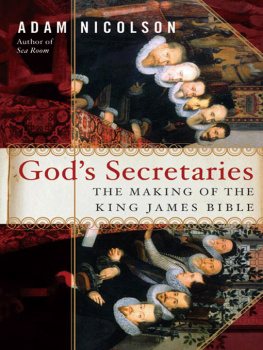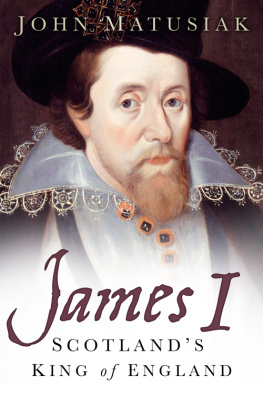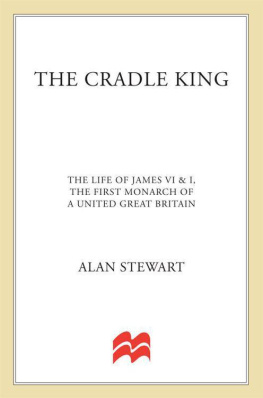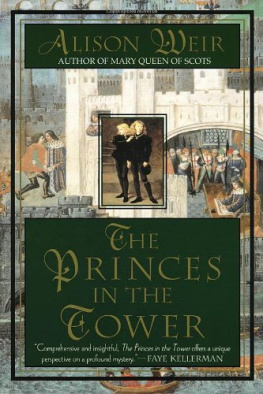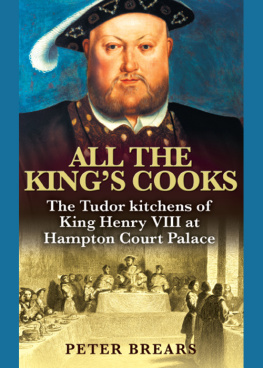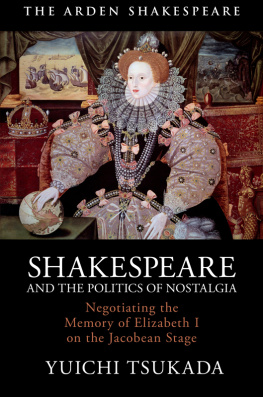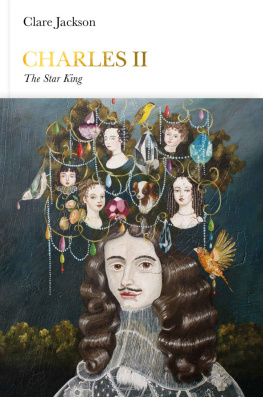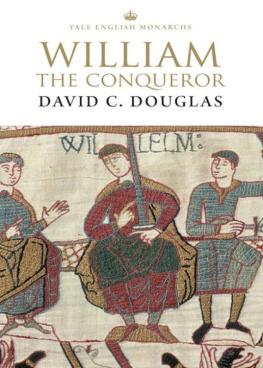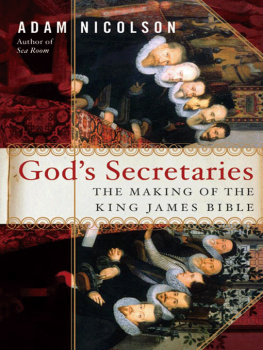Adam Nicolson has been both a publisher and a travel writer, and is the author of many award-winning books, including Sea Room , about life on the Shiant Isles. He lives on a farm with his family near Burwash, England.
Visit www.AuthorTracker.com for exclusive information on your favorite HarperCollins author.
England 16031611
1603
March 24: Queen Elizabeth dies
James accedes to throne of England and begins to promote union of England and Scotland
Catholic Bye and Main Plots to turn England Catholic effectively neutralised by Cecil
Lord Chamberlains Men become Kings Men
Outbreak of plague in England
1604
March: Jamess first parliament
August: Spanish envoys sign peace with England in Somerset House. The peace is sworn on a copy of the Vulgate, St Jeromes Latin Bible
James writes Counterblast against Tobacco
Othello, Merry Wives of Windsor and Measure for Measure
The King James Bible and its Translators
1603
April: Millenary petition presented to James requesting reform of church
William Barlow becomes prebendary at Westminster
1604
Hampton Court Conference on future of church
King and Bancroft draw up Rules for Translators
Translators appointed
Bancroft issues new canons for the church and becomes Archbishop of Canterbury
Work begins on the initial phases of translation
Henry Savile knighted (for 1,000 fee)
James Mountague becomes Dean of Worcester
William Dakins becomes Professor of Divinity at Gresham College, London
John Overalls wife elopes
1605
Masque of Blackness by Inigo Jones and Ben Jonson
November: Gunpowder Plot
Merchant of Venice, King Lear, Volpone, Westward Ho!
Francis Bacons Advancement of Learning
1606
Gunpowder Plotters mutilated and executed at St Pauls
Jesuit Henry Garnet hanged, drawn and quartered
Parliament reassembles; anti-papist legislation; 435,000 voted to the king
Death of Princess Sophia; William Barlow buries her
Christian IV of Denmark and retinue make hay in London
1607
120 colonists leave for Virginia
James swops Theobalds with Robert Cecil for Hatfield
Separatists in Lincolnshire come under pressure
Robert Carr catches the kings eye
Thames freezes over
1608
Brewster and Scrooby Separatists flee to Amsterdam
Robert Cecil becomes Lord Treasurer
1605
Edward Lively dies
Lancelot Andrewes becomes Bishop of Chichester
Andrewes, Barlow and Ravis preach against Gunpowder Plot
Thomas Ravis becomes Bishop of Gloucester
William Barlow becomes Bishop of Rochester
1606
Ralph Hutchinson dies
1607
William Dakins dies
John Reynolds dies; John Spenser becomes President of Corpus Christi
William Barlow becomes Bishop of Lincoln
Thomas Ravis becomes Bishop of London
1608
Lancelot Andrewes involved in controversy with Cardinal Bellarmine
James Mountague becomes Bishop of Bath and Wells
Samuel Ward becomes his chaplain
The king demands that the new translation is completed as soone as may be
1609
James brokers truce between Spain and the United Provinces as part of his programme for universal peace
Robert Cecil sets up Britains Burse on the Strand
1610
Henry IV of France stabbed to death; James turns white at the news
February: Parliament reassembles. Parliament makes grant of 200,000 to king but Cecils attempt to set royal finances on reliable basis (the Great Contract) breaks down
Shakespeare Sonnets published
The Tempest played at Whitehall
Royal debts mount
1611
Chapmans translation of Homer published
Raleigh in the Tower writes the History of the World
William Bedwell gives communion to Henry Hudson before he embarks on exploratory voyage to Cathay via North-West Passage
1609
Andrewes becomes Bishop of Ely and Privy Councillor
George Abbot becomes Bishop of Lichfield and Coventry
Thomas Ravis dies
Roger Fenton becomes prebendary at St Pauls in succession and thanks to Andrewes
Andrew Downes paid 50 by the king to persuade him to attend the Revision Committee
1610
Revision Committee meets in Stationers Hall in London
Samuel Ward becomes Master of Sidney Sussex
George Abbot becomes Bishop of London
Henry Savile begins publication of Chrysostom edition
Richard Bancroft establishes open access library at Lambeth
1611
King James Bible published
Giles Tomson becomes Bishop of Gloucester
One
A Poore Man Now Arrived
at the Land of Promise
And the LORD magnified Solomon exceedingly in the sight of all Israel, and bestowed vpon him such royal maiestie as had not bene on any king before him in Israel.
1 Chronicles 29:25
F ew moments in English history have been more hungry for the future, its mercurial possibilities and its hope of richness, than the spring of 1603. At last the old, hesitant, querulous and increasingly unapproachable Queen Elizabeth was dying. Nowadays, her courtiers and advisers spent their lives tiptoeing around her moods and her unpredictability. Lurching from one unaddressed financial crisis to the next, selling monopolies to favourites, she had begun to lose the affection of the country she had nurtured for so long. Elizabeth should have died years before. Most of her great menBurleigh, Leicester, Walsingham, even the beautiful Earl of Essex, executed after a futile and chaotic rebellion in 1601 had gone already. She had become a relict of a previous age and her wrinkled, pasteboard virginity now looked more like fruitlessness than purity. Her niggardliness had starved the fountain of patronage on which the workings of the country relied and those mechanisms, unoiled by the necessary largesse, were creaking. Her exhausted impatience made the process of government itself a labyrinth of tact and indirection.
The country felt younger and more vital than its queen. Cultural conservatives might have bemoaned the death of old values and the corruption of modern morals (largely from Italy, conceived of as a louche and violent place), but these were not the symptoms of decline. England was full of newness and potential: its population burgeoning, its merchant fleets combing the world, London growing like a hothouse plum, the sons of gentlemen crowding as never before into the colleges of Oxford and Cambridge, plants and fruits from all over the world arriving in its gardens and on its tablesbut the rigid carapace of the Elizabethan court lay like a cast-iron lid above it. The queens motto was still what it always had been: Semper eadem , Always the same. She hadnt moved with the times. So parsimonious had she been in elevating men to the peerage that by the end of her reign there were no more than sixty peers in the nobility of England. Scarcely a gentleman had been knighted by the queen for years.

